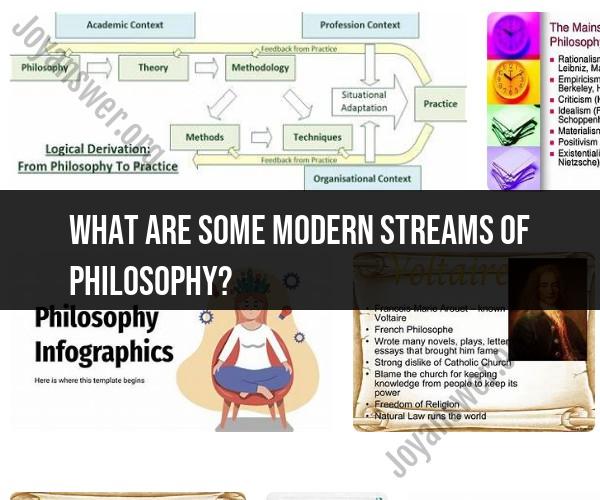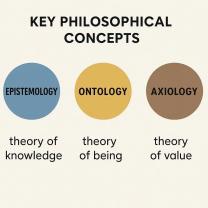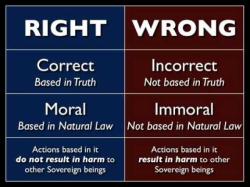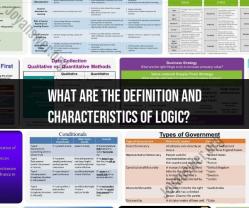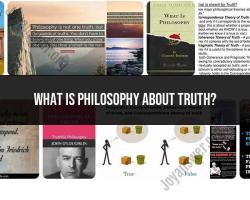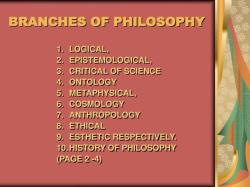What are some modern streams of Philosophy?
Contemporary philosophy encompasses a wide range of streams and trends that reflect the diverse interests and concerns of philosophers in the modern era. These streams often overlap and interact with each other. Here are some of the prominent modern streams of philosophy:
Analytic Philosophy:
- Analytic philosophy is characterized by its emphasis on clarity, logical analysis, and the precise use of language. It often focuses on questions related to language, meaning, and the philosophy of mind.
- Prominent figures include Ludwig Wittgenstein, Bertrand Russell, and Saul Kripke.
Continental Philosophy:
- Continental philosophy is associated with the European tradition and often explores topics related to existentialism, phenomenology, hermeneutics, and post-structuralism.
- Prominent figures include Jean-Paul Sartre, Martin Heidegger, Jacques Derrida, and Michel Foucault.
Pragmatism:
- Pragmatism emphasizes the practical consequences of beliefs and the importance of experience in shaping knowledge. It is concerned with the application of ideas to real-world problems.
- Prominent figures include Charles Peirce, William James, and John Dewey.
Philosophy of Science:
- Philosophy of science examines the nature of scientific knowledge, scientific methodology, and the relationship between science and philosophy.
- Prominent figures include Karl Popper, Thomas Kuhn, and Imre Lakatos.
Philosophy of Mind:
- Philosophy of mind explores questions related to consciousness, mental states, perception, and the nature of the self. It intersects with psychology and cognitive science.
- Prominent figures include Daniel Dennett, David Chalmers, and Patricia Churchland.
Ethics and Moral Philosophy:
- Contemporary ethical philosophy addresses questions related to moral values, ethical theories, and applied ethics in areas like bioethics and environmental ethics.
- Prominent figures include Martha Nussbaum, Peter Singer, and Alasdair MacIntyre.
Political Philosophy:
- Political philosophy examines concepts of justice, rights, democracy, and the role of the state. It addresses contemporary political issues and ideologies.
- Prominent figures include John Rawls, Robert Nozick, and Martha C. Nussbaum.
Feminist Philosophy:
- Feminist philosophy focuses on issues related to gender, equality, and the intersection of gender with other forms of identity and oppression. It critiques traditional philosophical concepts from a feminist perspective.
- Prominent figures include Simone de Beauvoir, Judith Butler, and bell hooks.
Environmental Philosophy:
- Environmental philosophy explores ethical, metaphysical, and epistemological questions concerning the environment, nature, and our relationship with the natural world.
- Prominent figures include Aldo Leopold, Arne Naess, and Holmes Rolston III.
African and Indigenous Philosophies:
- These streams of philosophy highlight the philosophical traditions and worldviews of African and Indigenous cultures, examining concepts like communalism, spirituality, and traditional knowledge systems.
- Prominent figures include Kwame Gyekye and Vine Deloria Jr.
Neurophilosophy:
- Neurophilosophy investigates the relationship between neuroscience and philosophy, exploring questions about the nature of consciousness, free will, and the brain-mind connection.
Existentialism:
- Existentialism explores themes of freedom, choice, individuality, and existential angst. It often addresses questions of authenticity and meaning in a seemingly indifferent universe.
These are just some of the diverse streams within contemporary philosophy. Each stream addresses a unique set of questions and engages with various philosophical traditions and methodologies. Contemporary philosophy continues to evolve and adapt to new challenges, incorporating insights from other disciplines and addressing pressing issues in the modern world.
Exploring Modern Streams of Philosophy
Modern philosophy is a diverse field that encompasses a wide range of schools of thought and perspectives. Some of the most important modern streams of philosophy include:
- Continental philosophy: Continental philosophy is a broad term that refers to philosophical traditions that developed in Europe in the 19th and 20th centuries. Continental philosophy is characterized by its focus on existentialism, phenomenology, and hermeneutics.
- Analytic philosophy: Analytic philosophy is a philosophical tradition that developed in the early 20th century. Analytic philosophy is characterized by its focus on logic, language, and epistemology.
- Feminist philosophy: Feminist philosophy is a philosophical tradition that emerged in the mid-20th century. Feminist philosophy is characterized by its focus on gender equality and the experiences of women.
- Postcolonial philosophy: Postcolonial philosophy is a philosophical tradition that emerged in the late 20th century. Postcolonial philosophy is characterized by its focus on the experiences of colonized peoples and the legacy of colonialism.
Contemporary Philosophical Movements and Trends
Some of the most important contemporary philosophical movements and trends include:
- Environmental philosophy: Environmental philosophy is a philosophical tradition that emerged in the late 20th century. Environmental philosophy is characterized by its focus on the relationship between humans and nature and the ethical implications of environmental problems.
- Cognitive science philosophy: Cognitive science philosophy is a philosophical tradition that emerged in the late 20th century. Cognitive science philosophy is characterized by its focus on the relationship between philosophy and cognitive science.
- Global philosophy: Global philosophy is a philosophical tradition that emerged in the late 20th century. Global philosophy is characterized by its focus on the philosophical problems that are raised by globalization.
Diverse Perspectives: Streams of Thought in Modern Philosophy
Modern philosophy is characterized by its diversity of perspectives. Some of the most important diverse streams of thought in modern philosophy include:
- African philosophy: African philosophy is a philosophical tradition that is rooted in the cultures and traditions of Africa. African philosophy is characterized by its focus on communalism, holism, and spirituality.
- Asian philosophy: Asian philosophy is a broad term that refers to philosophical traditions that developed in Asia. Asian philosophy is characterized by its focus on Confucianism, Taoism, Buddhism, and Hinduism.
- Islamic philosophy: Islamic philosophy is a philosophical tradition that is rooted in the Islamic faith. Islamic philosophy is characterized by its focus on rationalism, mysticism, and ethics.
These are just a few of the many important modern streams of philosophy. Modern philosophy is a vibrant and dynamic field, and new schools of thought and perspectives are emerging all the time.
In addition to the streams of thought mentioned above, there are many other important areas of modern philosophy, such as:
- Ethics: Ethics is the branch of philosophy that deals with moral questions.
- Metaphysics: Metaphysics is the branch of philosophy that deals with the nature of reality.
- Epistemology: Epistemology is the branch of philosophy that deals with the nature of knowledge.
- Political philosophy: Political philosophy is the branch of philosophy that deals with political questions, such as the nature of justice and the role of government.
Modern philosophy is a rich and diverse field, and there is something to interest everyone. If you are interested in learning more about modern philosophy, I encourage you to explore the many resources that are available online and in libraries.
